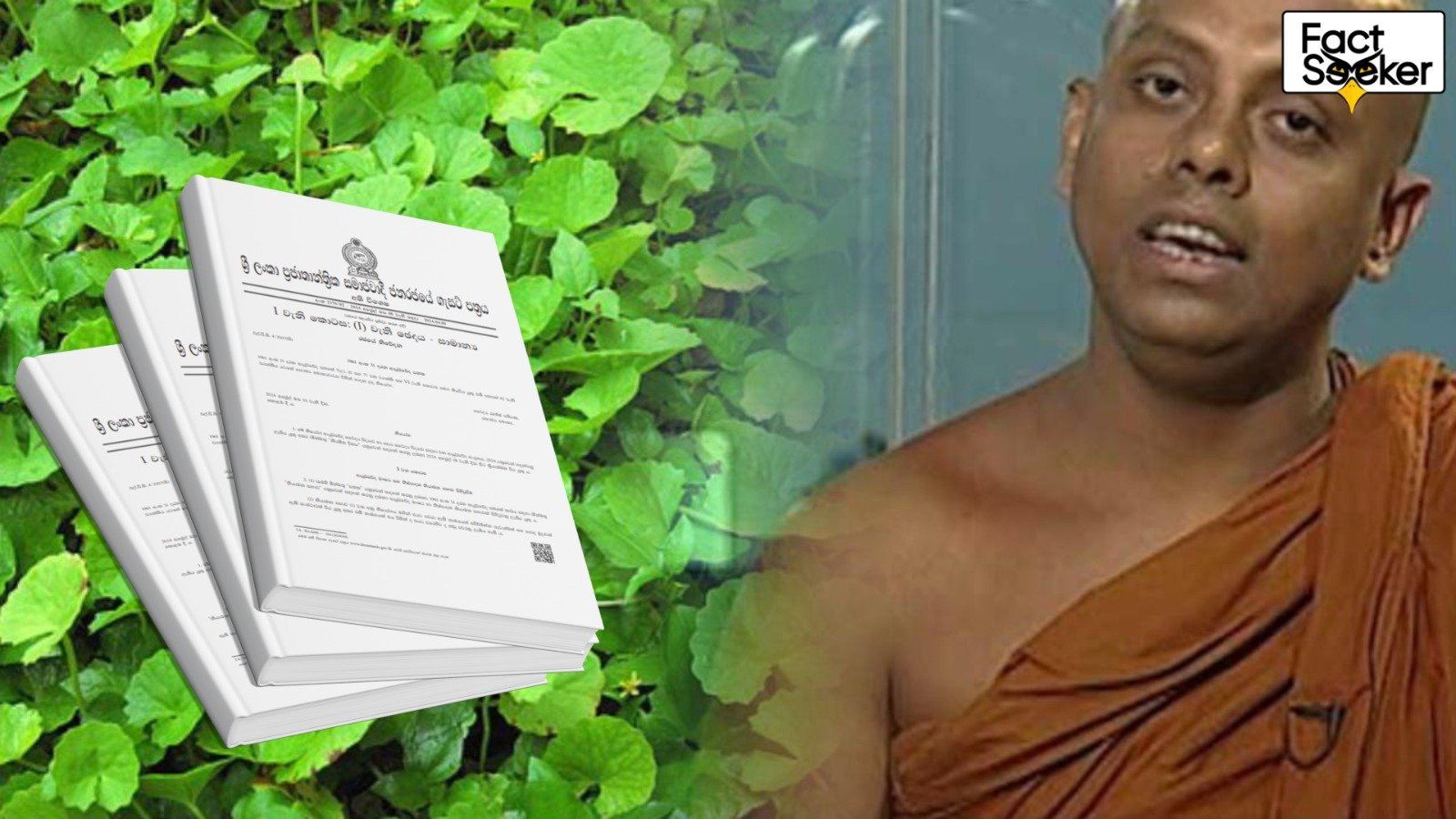Is cultivating herbs at home illegal?

A recent statement by Pahiyangala Ananda Sagara Thero, President of the 'Surakimu Lanka' National Organization, has raised concerns about the legality of cultivating herbs at home.
by Anonymous |
August 23, 2024

A recent statement by Pahiyangala Ananda Sagara Thero, President of the ‘Surakimu Lanka’ National Organization, has raised concerns about the legality of cultivating herbs at home.

The Thero made the statement at the Monaragala Bhikkhu Advisory Council on August 10, suggesting that cultivating greens like Gotukola in home gardens could result in a one-year imprisonment and a fine of Rs. 100,000. This assertion was reported by mainstream media.
“You don’t have to do this Cannabis business to build this country. There was a gazette issued during the past few days. This gazette contains plants that can and cannot be grown within the country. They wil recieve a jail term of one year, and a fine of Rs 100,000 for illegal cultivation of a variety of greens, even Gotukola. Why Is that? Because even Cannabis is on that list. Now even Cannabis is on that no-farming list. Gotukola, Mukunuwenna and other leaves are included on the list as well. According to this gazette, if you cultivate Gotukola at home, you will be sentenced to one year of imprisonment” the Thero said.

The confusion stems from an Extraordinary Gazette issued on August 4, 2024, which outlines regulations under the ‘Ayurvedic Code for Ayurvedic Medicine and Surgery.’ This gazette, part of the recent amendments to the Ayurveda Act No. 31 of 1961, is designed to regulate the cultivation of medicinal plants for pharmaceutical purposes.
Key sections of the Ayurveda (Amendment) Act, No. 19 of 2023, highlight the objectives of managing herb cultivation for research and quality assurance in Ayurvedic medicine.
Notably, Section 7(g) emphasizes the provision of quality Ayurvedic goods and materials, while Section 10 updates terminology related to Ayurvedic hospitals and herb cultivation. Section 77 grants authority to regulate the production of medicinal plants, including licensing requirements.
The objectives of the Act are outlined and its 7. Sub-section (g) states:
“To provide quality Ayurvedic goods, materials or medicines by the Department or by a board established under Part VI of the Act for the purpose of doing so by implementing the provisions of the Code referred to under Section 77 and to manage herb gardens or herb cultivation for research and extension.” shown as.
Section 10 of the New Amendment Act contains Section 10 of the Main Statute,
Wherever the words “Ayurvedic Arogya shala” appear, they are replaced by the words “Ayurvedic hospitals, herb cultivation”,
Wherever the word “hospital” appears, it has been amended, replacing it with the words “hospital, herb cultivation”.
Section 41 of the Ayurveda (Amendment) Act, No. 19 of 2023 has amended Section 77 of the Main Statute. It includes that orders under this Act may be made prescribing an Ayurvedic Code containing all the provisions considered necessary by the authority having authority to prohibit, regulate or control the production of any product, substance or drug for the purpose of Ayurvedic medicine and surgery.
Sub-section 77(j) empowers the authorities concerned to make orders for “publication of any medicinal plant which requires a license or permit for cultivation”.
Accordingly, it became clear to us that one of the basic requirements of issuing this gazette notification was to regulate the cultivation of herbs used in pharmaceutical production using medicinal plants.
There are 407 medicinal plants such as Cannabis, Gotukola, Mukunuwanna published under the ‘List of Plant Medicines’ mentioned under Part I of schedule I of the ‘Ayurvedic Code for Ayurvedic Medicine and Surgery, 2024’ (Gazette Notification).
Among the 407 medicinal plants listed in the Gazette are Cannabis, Gotukola, and Mukunuwanna.
However, Assistant Commissioner (Technical) of the Department of Ayurveda, Dr. H.K.P. Tharanga, clarified that the gazette does not prohibit personal cultivation of these herbs for consumption or sale. It primarily regulates the production of these plants for medicinal use, requiring appropriate permissions from the Department of Ayurveda.
Dr. Tharanga emphasized that the gazette permits the cultivation of medicinal plants, including Cannabis, only under specific conditions and with proper authorization. The primary focus is on regulating mass cultivation for pharmaceutical purposes, in accordance with other existing laws like the Poisons, Opium, and Dangerous Drugs Act.
Thus, FactSeeker confirms that the statement made by Pahiyangala Ananda Sagara Thero regarding severe penalties of cultivating herbs at home is a misinterpretation of the gazette’s provisions.






